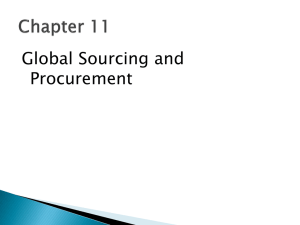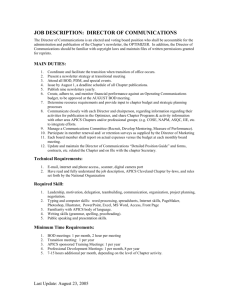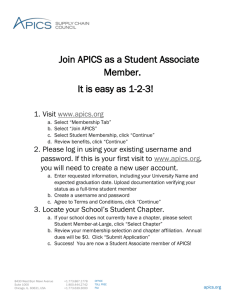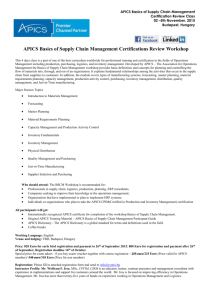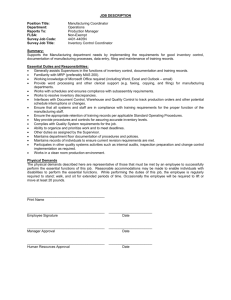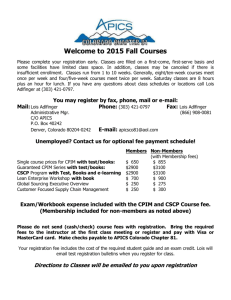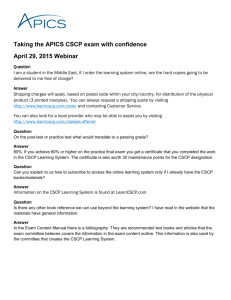Supply Chain Management
advertisement
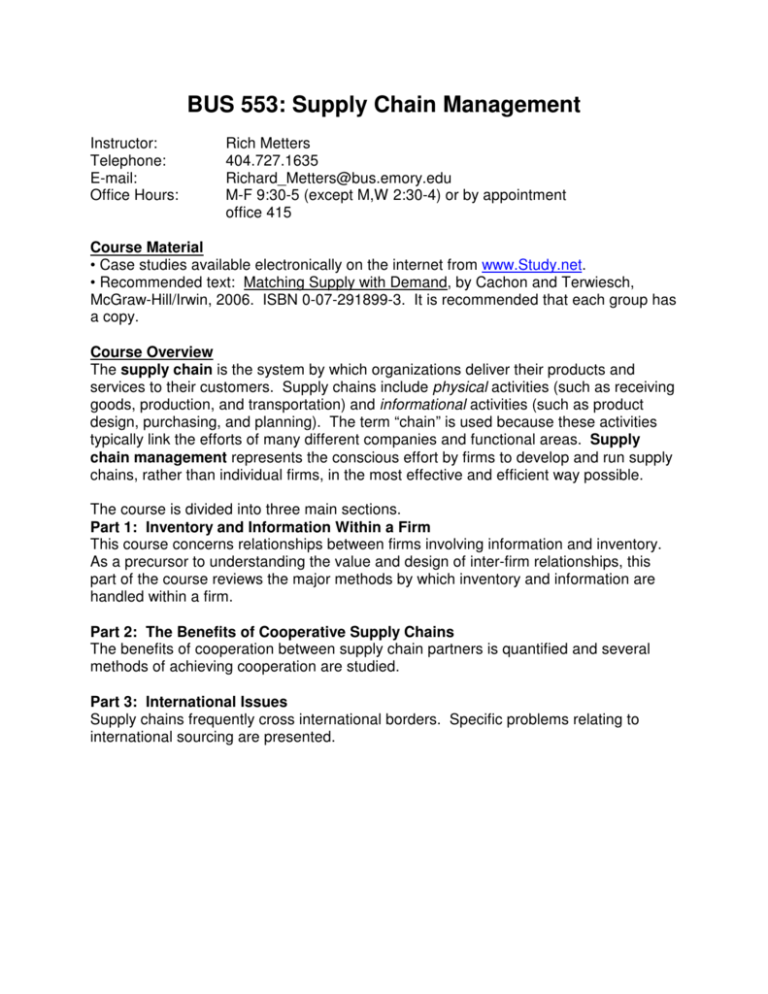
BUS 553: Supply Chain Management Instructor: Telephone: E-mail: Office Hours: Rich Metters 404.727.1635 Richard_Metters@bus.emory.edu M-F 9:30-5 (except M,W 2:30-4) or by appointment office 415 Course Material • Case studies available electronically on the internet from www.Study.net. • Recommended text: Matching Supply with Demand, by Cachon and Terwiesch, McGraw-Hill/Irwin, 2006. ISBN 0-07-291899-3. It is recommended that each group has a copy. Course Overview The supply chain is the system by which organizations deliver their products and services to their customers. Supply chains include physical activities (such as receiving goods, production, and transportation) and informational activities (such as product design, purchasing, and planning). The term “chain” is used because these activities typically link the efforts of many different companies and functional areas. Supply chain management represents the conscious effort by firms to develop and run supply chains, rather than individual firms, in the most effective and efficient way possible. The course is divided into three main sections. Part 1: Inventory and Information Within a Firm This course concerns relationships between firms involving information and inventory. As a precursor to understanding the value and design of inter-firm relationships, this part of the course reviews the major methods by which inventory and information are handled within a firm. Part 2: The Benefits of Cooperative Supply Chains The benefits of cooperation between supply chain partners is quantified and several methods of achieving cooperation are studied. Part 3: International Issues Supply chains frequently cross international borders. Specific problems relating to international sourcing are presented. Grading/Workload The course grade will include both individual and group components. Individual components include class participation and a final exam, while group components include written case evaluations, quantitative assignments, and the mid-term exam. Group grades Global Supply Chain simulation (10%) Inventory Assignment (5%) Choose 3 from: (10% each) Supply Chain Close-up: The Video Vault Bayerische Motoren Werke AG Sport Obermeyer Emerson Electric HP Deskjet Printer Midterm exam (15%) Individual grades Participation (20%) Final exam (20%) Participation is required. Due to the interactive and experiential nature of the course, preparation and participation are imperative. Repeated lack of preparation will result in course failure, regardless of other course grades. The majority of the participation grade will center on case discussion in class, but participation in all class sessions is graded. The purpose behind this is to foster stimulating class discussions. As to case studies, specific questions will be handed-out to guide case analysis, but ideas regarding cases should not focus solely on the questions handed-out. Group grades are based on grades for the written cases as well as group class participation in group oriented activities. "Group Peer Grade" refers to the grade given a student by other students in their group. At the end of the semester, students anonymously grade the performance of other group members. The “Group Peer Evaluation” form used for this purpose is included in this syllabus. In addition to graded cases, there will also be several assignments that require group work. Group Case requirements: For style considerations, a review of the case is unnecessary, but it is important to cite case facts to justify conclusions. Also, a balanced approach is recommended for case write-ups. Comment on both the strengths and weaknesses of managerial action depicted in the case, rather than focusing in only on weaknesses. Questions will be handed-out to guide case write-ups. The case write-up should not focus solely on the questions handed-out. Arriving at satisfactory answers to the questions asked will receive a "PS." While content is the preeminent consideration, poor editing (e.g., incorrect spelling, inconsistent spacing, poor grammar) will result in a lower grade. The main objective of requiring written cases is to provoke thoughtful, reasoned arguments that enhance the educational process for the entire class. For that reason, arguments must be raised in class discussion to count for grading in a case write-up. You will be asked to fill out the following form regarding your group experience at the end of the term: GROUP PEER EVALUATION Name The group component to the grade for an individual is the combination of the group grade and the group peer evaluation. The overall group grade is adjusted for an individual in response to the peer evaluations. List your group members - other than yourself - in the spaces provided. Included in your assessment of group contribution can be such areas as: meeting attendance, punctuality and preparedness; helpful or disruptive attitudes at meetings; contribution to group discussion; etc. For each individual in a group, the group grade is adjusted up or down on the basis of the peer evaluations. For active group members, assign positive or negative grade points based on their group contribution. For example, a +1.0 indicates a helpful group member who deserves a full letter grade above the group average and -1.0 indicates a full letter grade below the group average. Alternatively, you can designate a specific grade for group members. This is usually appropriate when an individual has made little or no contribution to the group. In that case, a designated "LP" or "NC" may be appropriate. This is taken seriously in overall grading. If, for example, the group peer evaluations give an NC grade to an individual, the individual will fail that portion of the course, regardless of the overall group grade. If there are circumstances which should be considered in the group peer evaluation, write your comments on this page. Due to the potential for misrepresentation and lack of confidentiality, this form must be handed to me in person. Group Member Do not include yourself in this list Example: Jane Doe Point Score +0.5 Designated Grade Expected Class Schedule: Actual mileage may vary Cases in bold print 9/13 Course Introduction Part 1: Inventory and Information Within a Firm Inventory – Independent demand Reading: Chapter 2, 2.4-2.5, p.19-26. 9/20 Inventory – (probably more) Independent demand Inventory game Reading: Chapter 9, p.178-205. Chapter 5, 5.1-5.5, p.75-91. 9/27 Inventory – Dependent demand: Material Requirements Planning Master Production Scheduling Game (10/2 Group inventory assignment due by e-mail) 10/4 Just-In-Time systems Reading: Does Manufacturing Need a JIT Revolution? Chapter 8, 8.8-8.9, p. 170-176. Just-In-Time case study: Toyota Motor Manufacturing, USA, Inc. 9-693-019 10/13 Optional Plant Tour: Eaton Corp. 10/11 Group Mid-term exam due Part 2: The Benefits of Cooperative Supply Chains Readings for this section of the course, covering 10/18-11/15 Reading (from BUS 551): What is the Right Supply Chain for Your Product? Reading: HBS note Aligning Incentives in Supply Chains 9-600-110 10/18 Costs of Uncoordinated Supply Chains: Supply Chain Close-up: The Video Vault 9-102-070 Specific topics: double marginalization; revenue sharing; markdown money; joint inventory ordering, learning curves Reading: Chapter 14, 14.3-14.5, p.350-360. Syncra Systems 9-601-035 10/25 Sustainable supply chains: Bayerische Motoren Werke AG (A) (Not available on study.net) Logistics capabilities in supply chains: 11/1 Logistics guest speaker: Steve Ellet, Chainalytics Strategic supply chain alliances Laura Ashley and Federal Express Strategic Alliance 9-693-050 11/8 High variety, quick response supply chains Guest speaker: Tom Beaty, President, Insight Sourcing Group JIT II: Bose Corporation: The JIT II Program (A) 9-694-001 Part 3: International Issues 11/15 Forecasting: Sport Obermeyer, Ltd. 9-695-022 Cost analysis in international Sourcing: Emerson Electric Company APC Division: The Fan Subpack Sourcing Decision (Darden) UVA-OM-0631 11/22 No class. Thanksgiving holiday. 11/29 Global Supply Chain Simulation. 12/6 Supply Chain Ethics: Levi Strauss & Co.: Global Sourcing 9-395-127 Product Design: HP Deskjet Printer (Stanford) SBSCMF-002-2001 Reading: Chapter 12, 12.1-12.2, p.280-293. Final Exam Special Events Practitioner Meetings concerning Supply Chain Management CSCMP (“Council of Supply Chain Management Professionals,” formerly known as the “Council of Logistics Management,” which was formerly known as “National Council on Physical Distribution Management”) www.atlantaclm.org 9,000 members From their website: The Atlanta Roundtable usually meets on the first Monday of the month from September through June each year. Dinner guest registration begins at 6:00PM. Register promptly and join your Atlanta area logistics colleagues for the hospitality and networking time before dinner meeting seating beginning at 6:30pm. They are held at Marriott Perimeter Hotel. The hotel is on I-285, just East of Georgia Route 400 (take 400 North to I-285 East - travel time is 20 minutes if traffic is light). Dinners for students who are CLM members are free of charge. Student membership is $20. Membership applications are at www.clm1.org. STUDENTS- before completing the registration form, please email Brian Gibson bgibson@business.auburn.edu in order to insure availability. APICS (“The Educational Society for Resource Management,” the organization formerly known as “American Production and Inventory Control Society”) www.apicsatlanta.org 70,000 members. Student cost for meetings: $12.50. The Atlanta chapter is one of 270 in the country. The Atlanta chapter has "Northside" and "Southside" meetings during the calendar year. The Northside Branch will hold monthly Professional Development Meetings, beginning in September, on the third Tuesday of each month. The location is at the Hilton Garden Inn, Atlanta Perimeter Center (located just off I-285 and Ashford Dunwoody Rd) 1501 Lake Hearn Drive, NE Atlanta, GA 30319, 404 459-0500 phone The Southside Branch will hold monthly Professional Development Meetings, beginning in September, on the third Thursday of each month. The location is at the Sheraton Gateway Hotel at the Atlanta Airport. APICS also offers certification in Supply Chain Management. From their web site: Certified in Supply Chain Professional (CSCP) Here is the latest from APICS about the new CSCP certification. We will offer a course in Atlanta starting on Oct 5th. This will be held at the Country Club of Roswell. The new APICS CSCP exam information is now available on the APICS Web site. Please visit www.apics.org/APICS CSCP and select Domestic Testing to review the updated information. Important APICS CSCP Exam Deadlines Eligibility applications due: September 29, 2006 Exam registration form due: TBD Exam administration: December 2, 2006 ISM (“Institute of Supply Management,” formerly known as the “National Association of Purchasing Management”) www.napmga.org 45,000 members. From their web site: The National Association of Purchasing Management-Georgia is recognized as the leading organization in our area for the support of purchasing and materials management professionalism. Their first meeting this year is September 14. Giving a talk will be Chris Brand of “Friends of Disabled Adults and Children.”
